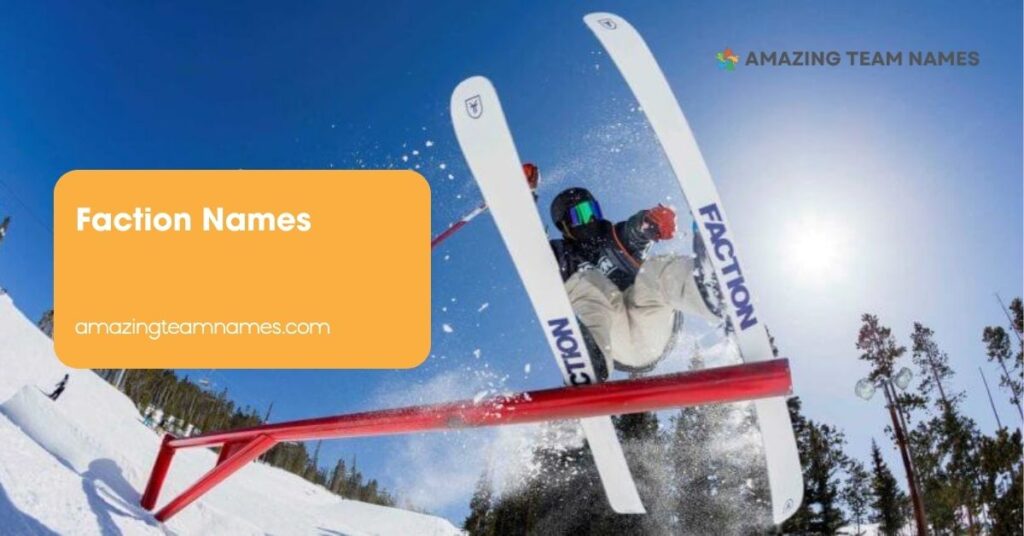In the industry of storytelling and gaming, faction names hold incredible power. They can evoke a sense of belonging, ignite passion, and even shape the destiny of entire narratives. Whether you’re crafting a fantasy epic or designing a thrilling game, choosing the right faction name is essential to captivate your audience and enhance their experience.
Imagine the thrill of immersing yourself in a story where each faction name tells a tale of its own. From the fierce warriors of the Ironclad Legion to the cunning strategists of the Shadow Council, each name carries weight and meaning. You have the opportunity to create a industry that resonates with your audience and draws them in deeper. Jump into the art of crafting unforgettable faction names and watch your stories come to life like never before.
Understanding Faction Names

Creating faction names involves several important steps. First, you’ll want to consider the theme of your story. A name like “Ironclad Legion” evokes strength and resilience, while “Shadow Council” suggests secrecy and intrigue. These themes can guide your naming process.
Next, think about the faction’s purpose or goals. Names that reflect their mission help establish their role in the narrative. For instance, if your faction aims for revolution, names like “Freedom Alliance” can resonate with your audience.
Exploring etymology can provide depth. Many names draw from historical or mythological references. This connection can enhance engagement by resonating with readers who recognize the cultural significance behind them.
Another essential factor is the sound of the name. You’ll want it to be memorable. Names with alliteration or rhythm often stick in the minds of your audience. “Brave Brotherhood” or “Cunning Collective” exemplify this technique.
Finally, test the names through feedback. Sharing your ideas with others can offer fresh perspectives. You might refine your choices to better align with your intended narrative and audience expectations. Captivating with your community can help you develop a name that resonates and captivates.
Exploring Popular Faction Names

Faction names play a vital role in building identity and connection across various narratives. They can make a story more immersive or a gaming experience more captivating.
Faction Names in Fictional Universes
You often find that names in fictional universes reflect the characteristics of their factions. For instance, “Stormbringers” suggests mastery over natural elements, while “Shadowclan” evokes notions of secrecy and unity. Titles like “Order of the Phoenix” and “Iron Keepers” lend an air of importance and dignity. Mythological references can add authenticity, exemplified by names such as “Valhalla Guard” or “Elven Council.” Using these themes helps resonate with readers, making the stories more captivating.
Faction Names in Gaming Communities
Humor and creativity often shine through faction names in gaming. Consider groups like the “Frosty Bashers” or the “Gods of Undead,” which showcase the personality of the player community. Names like “Hawk Masters” and “High Ping Squad” add a playful element, embodying the lighthearted spirit of gaming. These names invite players to form connections, improving their overall experience.
Faction Names in Historical Context
Historical inspiration can also inform cohesive and relevant faction names. Names drawn from important historical events or figures often carry weight and meaning. For example, “Sons of Liberty” invokes a revolutionary spirit, while “Knights Templar” brings to mind tales of valor and chivalry. When you create names that echo history, you gain depth and context, enriching your narrative industry.
Creating Unique Faction Names
Creating compelling faction names is essential for improving storytelling. You can use various strategies to generate names that resonate with the essence of your faction and intrigue your audience.
Tips for Crafting Effective Faction Names
- Define your faction’s traits. Understand your faction’s beliefs, goals, and characteristics. These elements guide the name you choose. For instance, a faction centered on survival may emphasize resilience and community.
- Determine the tone. Decide if the name should be serious, whimsical, ominous, or heroic. A name like “The Iron Fist” evokes aggression, while “The Green Guardians” conveys peace. Adjust the tone to reflect the faction’s identity.
- Research language and culture. Draw inspiration from various languages and mythologies that relate to your faction’s traits. For example, tapping into Latin could inspire a name like “Fortitudo,” meaning strength, which aligns with themes of honor and bravery.
- Consider sound and memorability. Think about the name’s phonetics to aid recollection. Techniques like alliteration can be effective. Names such as “Brave Brotherhood” stick in the mind, making them more memorable.
- Test your options. Seek feedback on your name choices. This input helps refine your selections and ensures they resonate with your intended audience. Captivating others in the process can lead to valuable insights.
Examples of Creative Faction Name Generators
- Faction Name Generator: This tool generates unique names based on keywords you provide, allowing for quick idea generation.
- Fantasy Name Generator: Ideal for fantasy themes, this generator blends genres to create diverse names that suit various factions.
- Name Generator Fun: This online tool offers a mix of whimsical and serious names, perfect for different storytelling contexts. You can customize it based on tone and style.
- Fantasy Faction Name Generator: Specifically designed for fantasy settings, it offers names that capture the magic and mystery of the genre, giving your factions a distinct flair.
You’ll find these generators convenient for brainstorming new ideas. They can spark inspiration, leading to unique faction names that enhance your narrative.
Analyzing Faction Names in Pop Culture

Faction names play an essential role in shaping narratives across various forms of media. They evoke themes and traits that resonate with audiences, enriching storytelling.
Faction Names in Movies and TV Shows
In the “Divergent” series, society is divided into five distinct factions, each reflecting core virtues. Examples include Abnegation for selflessness and Dauntless for bravery. Those names not only define character motivations but also shape the overall plot.
During the thrilling narrative of “The Hunger Games,” different districts form unique factions with their names symbolizing their characteristics. District 1 focuses on luxury goods while District 12 represents coal mining. Each name provides insight into the culture and struggles of its residents, deepening viewer engagement.
Faction Names in Literature
Great literature often features factions that create conflict or camaraderie among characters. For instance, in “Harry Potter,” the Order of the Phoenix embodies resistance and unity in the face of evil. Such names encapsulate the group’s mission while improving thematic depth.
In epic fantasy like “The Lord of the Rings,” factions like the Fellowship of the Ring signify bravery and friendship. Each name carries important weight, emphasizing the group’s search and their diverse member backgrounds.
Eventually, faction names in both movies and literature contribute to industry-building and character development, allowing audiences to connect with narratives on a deeper level.
The Importance of Faction Names

Faction names play a vital role in storytelling and industry-building, shaping the reader’s experience. Consider the depth a well-chosen name can add to your narrative. Names evoke emotions and hint at deeper meanings that make your industry more believable.
Reflecting on the essence of the group, a faction name should communicate its philosophy, mission, and values. For instance, “The Iron Fist” suggests power and aggression, while “The Green Guardians” conveys protection and a commitment to nature. This clarity helps readers quickly grasp who the faction is and what it stands for.
Exploring the theme of your story can guide your naming process. Choose names that align with your faction’s purpose. “Freedom Alliance,” for instance, resonates with revolutionary themes, immediately providing context to the reader about the faction’s goals.
Also, diving into etymology can enhance your faction names. Drawing inspiration from historical or mythological references captivates your audience. Names like “Knights Templar” evoke the courage of a storied past, assisting readers in connecting emotionally with the narrative.
Pay attention to the sound of the names as well. Techniques like alliteration can enhance memorability, making names catchy and impactful. You might consider “Brave Brotherhood” for a faction that embodies camaraderie and unity.
Finally, never underestimate the power of feedback. Testing your faction names with potential readers can refine your choices. Ensure your names resonate with your audience, creating a lasting impression that enriches your storytelling.
Conclusion
Crafting memorable faction names isn’t just a creative exercise; it’s a vital component of storytelling and gaming. The right name can evoke emotions and establish connections that deepen audience engagement. By thoughtfully considering themes, traits, and cultural references, you can create names that resonate and enhance your narrative.
Don’t underestimate the power of sound and memorability in your choices. Whether you’re drawing inspiration from history or experimenting with phonetics, every detail matters. Testing your names through feedback can help ensure they hit the mark with your audience.
As you embark on your naming journey, remember that a well-chosen faction name can elevate your story and leave a lasting impression. Embrace the art of naming and watch your narratives come alive.
Frequently Asked Questions
Why are faction names important in storytelling and gaming?
Faction names are essential because they create a sense of belonging for characters and players. They also influence narratives and audience immersion, making stories more engaging. Names like “Ironclad Legion” or “Shadow Council” evoke strong themes that enhance the overall experience.
How can I create effective faction names?
To create effective faction names, consider the story’s theme, the faction’s purpose, and use relevant etymology. Make names memorable through phonetics or alliteration, such as “Brave Brotherhood.” Testing names with feedback helps refine your choices to ensure they resonate with the audience.
What are some examples of popular faction names?
Popular faction names include “Stormbringers,” “Iron Keepers,” and “Order of the Phoenix.” These names encapsulate the factions’ characteristics and themes, contributing significantly to identity and audience connection in various narratives, from literature to gaming.
How does pop culture influence faction naming?
Pop culture shapes faction naming by reflecting core virtues and cultural aspects. Names in series like “Divergent” and “The Hunger Games” convey crucial themes, enhancing viewer engagement and character development, allowing audiences to connect more deeply with the story.
What tools are available for generating faction names?
There are various faction name generators available online that can help brainstorm unique names. These tools provide inspiration for creating names that align with your faction’s traits and enhance the storytelling experience.







